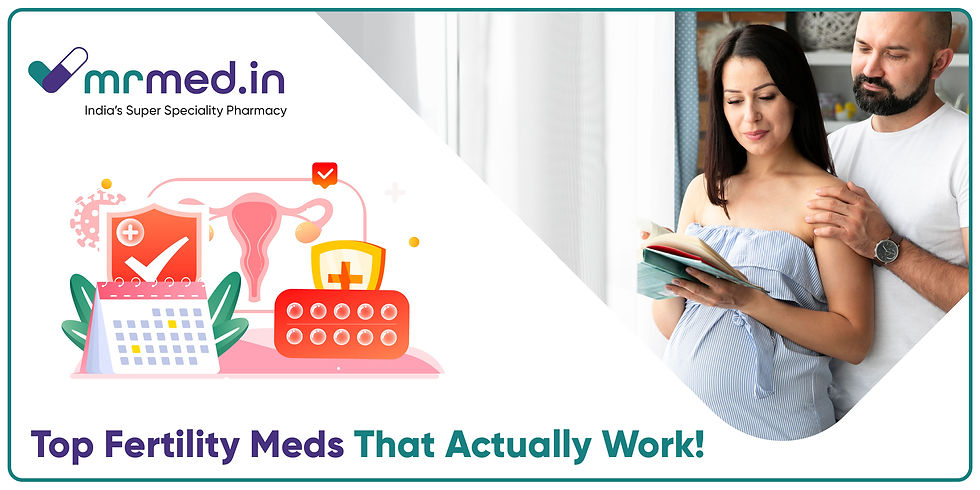What Medicine Increases Fertility? Expert-Recommended Options
- Healthcare Tips

- Mar 5, 2025
- 4 min read

Fertility challenges can be overwhelming, but you don’t have to face them alone. Whether it’s irregular cycles, low sperm count, or hormonal imbalances, advancements in reproductive medicine have made conception possible for many.
In this article, we’ll explore expert-recommended fertility treatments and medications that can help you take control of your reproductive health and boost your chances of starting a family.
What causes fertility problems?
Fertility issues can stem from a variety of factors, and understanding the root cause is crucial to effective treatment. Common causes include hormonal imbalances, structural issues, and environmental factors. So, what exactly might be affecting your fertility?
1. For women:
Irregular ovulation
Blocked fallopian tubes
Conditions like polycystic ovary syndrome (PCOS)
2. For men:
Low sperm count
Poor sperm motility
Structural abnormalities
Hormonal imbalances, particularly low levels of follicle-stimulating hormone (FSH) or luteinising hormone (LH), often play a central role, and addressing these issues is typically the first step in treatment.
What are the best medications to increase fertility?
Many individuals facing fertility issues can benefit from medications that regulate ovulation and improve reproductive function. These treatments typically stimulate the ovaries or correct hormonal imbalances. Here are some commonly prescribed medications to boost fertility:
1. Clomiphene Citrate (Clomid)
One of the most widely prescribed medications for fertility, Clomiphene Citrate is often used to help women who struggle with irregular ovulation or anovulation (lack of ovulation). It works by blocking estrogen receptors in the hypothalamus, signalling the brain to release more FSH and LH, which then stimulate the ovaries to produce eggs.
Clomid is typically taken in pill form for five days early in the menstrual cycle, and many women can expect to ovulate within a few weeks of starting treatment. For women with polycystic ovary syndrome (PCOS), Clomid is particularly beneficial, as it can help regulate ovulation in women who are otherwise not ovulating regularly.
2. Gonadotropins (FSH and LH Hormones)
For women not producing enough FSH and LH to trigger ovulation, injectable gonadotropins are often used. These injections, which contain FSH, LH, or a combination, stimulate the ovaries to release eggs and are typically prescribed when oral medications like Clomid are ineffective.
Inj Humog 150: Contains FSH, administered through daily injections early in the cycle. Monitoring by a fertility specialist is essential to avoid ovarian hyperstimulation syndrome (OHSS).
Gonal-F Injection: Contains Follitropin Alfa, a synthetic form of FSH, and is commonly used with assisted reproductive technologies like IUI or IVF to stimulate the ovaries for multiple egg production.
3. Menotrophin (Pergonal)
Menotrophin, also known by its brand name Pergonal, is another form of injectable fertility medication that contains both FSH and LH. This combination of hormones helps stimulate the ovaries, encouraging them to produce multiple eggs for ovulation. It’s often used in cases where women may have difficulty ovulating naturally or when ovulation does not occur despite using oral medications like Clomid.
Menotrophin is also frequently used in IVF treatments, where controlled ovarian hyperstimulation is necessary to maximise the number of mature eggs retrieved for fertilisation. It’s important to note that Menotrophin treatment requires careful monitoring through ultrasounds and blood tests to ensure proper ovarian response.
4. Letrozole (Femara)
Letrozole is a medication originally used to treat breast cancer, but it has also proven effective in stimulating ovulation. It works by inhibiting the production of estrogen, which leads to an increase in FSH and LH secretion. This, in turn, can encourage the ovaries to produce eggs.
Letrozole is typically used in women with PCOS who do not respond to Clomid. It’s often favoured for its ability to stimulate ovulation without the same risks of multiple pregnancies or ovarian hyperstimulation associated with other fertility medications.
5. Progesterone
While progesterone doesn’t directly stimulate ovulation, it plays a crucial role in supporting early pregnancy once an egg has been fertilised. Progesterone supplements are commonly used during fertility treatments like IVF to help maintain the uterine lining and support embryo implantation.
Progesterone can be administered orally, vaginally, or through injections, and it’s often prescribed after egg retrieval during IVF cycles or following ovulation induction treatments.
What is Assisted Reproductive Technologies (ART)?
For couples facing infertility, medications alone may not always be enough. In these cases, assisted reproductive technologies (ART) like intrauterine insemination (IUI) or in vitro fertilisation (IVF) are often used alongside fertility medications to overcome more complex issues. The steps involved in IVF are:
Eggs are retrieved from the ovaries
Fertilised with sperm in the lab
Embryos are implanted into the uterus
IVF is commonly paired with hormonal treatments, such as gonadotropins or Clomid, to stimulate the ovaries and increase the chances of a successful pregnancy.
How does lifestyle impact women's health and fertility?
While fertility medications play a key role in improving your chances of conception, lifestyle choices are just as important. So, how can you optimise your health to support fertility?
Maintain a healthy diet.
Manage stress
Exercise regularly
Avoid smoking and excessive alcohol
Reproductive awareness is also crucial. Tracking your menstrual cycle and recognising ovulation signs can help pinpoint your most fertile days. Additionally, consulting with your doctor can provide personalised advice to support your fertility journey.
Wrapping up
Several fertility treatments, including oral medications, address specific issues to improve the chances of conception. Consulting a fertility expert helps identify the best approach for a successful pregnancy. Alongside medications, lifestyle choices and reproductive awareness are crucial in boosting fertility.
Combining medical treatments with healthy habits can enhance your chances of starting or expanding your family. Reach out to a reproductive specialist for personalised guidance and support on your fertility journey.
Comments